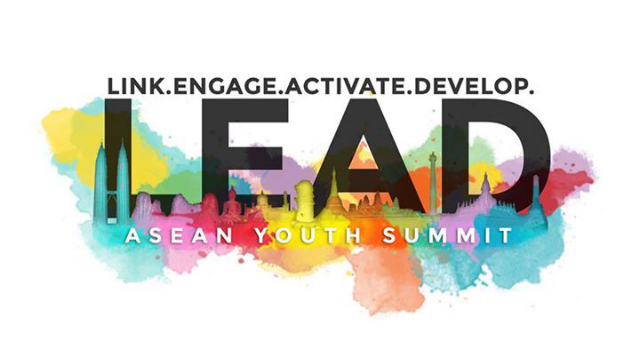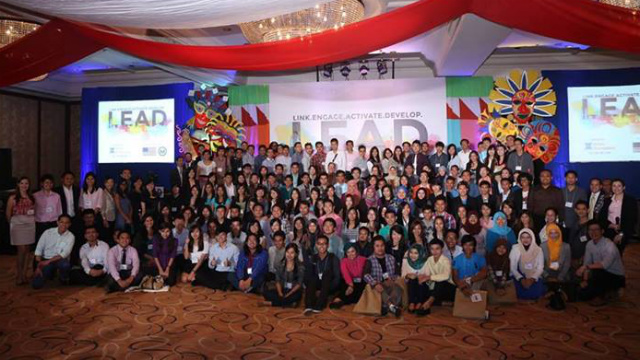SUMMARY
This is AI generated summarization, which may have errors. For context, always refer to the full article.

MAKATI, Philippines — Around 150 delegates from 10 member-countries of the ASEAN attended the LEAD Youth Summit 2013 on Wednesday, December 3.
The summit centered on youth empowerment and inter-regional communion. LEAD also stands for tasks that youth leadership entailed: link, engage, activate, and develop.
The crazy ones
What is the role of youth empowerment in the struggle for environmental sustainability and climate change adaptation?
This was the main question posed to the delegates during the opening ceremony of the ASEAN LEAD Youth Summit 2013.
Lawyer Antonio Oposa Jr recalled his own experiences being on the frontlines of environmental policy reform. From these challenges, Oposa highlighted the need for innovative thinking and the capacity of the youth to fuel a greener, brighter future.
“You are the crazy ones, the ones who can make things happen,” he said, addressing the delegates.
He added that prioritizing the environment in legislation is part of “the principle of intergenerational responsibility” or the responsibility of the current generation to protect the environment for the lives of the next generation.
Change from within
Keynote speakers during the opening ceremony also presented effective approaches to a more sustainable future.
In Oposa’s case, this involved not just being open to environmentally sustainable alternatives, but demanding it as one’s own right as well as the right of future generations.
Tri Mumpuni, a leader in rural development in Indonesia, presented an alternative that focuses on integrating social entrepreneurship in the current educational system.
“The system is made to train people how to maximize profits, how to market consumerism, how to market capitalization. This needs to change. Social entreneurship is to think of the social benefit, not the profit… [It] is the whole paradigm of the ASEAN partnership,” she explained.
Mumpuni also warned the young audience against an even more alarming epidemic, which she called “EDHD” or empathy deficit hyperactive disorder.
“Once people lose their empathy, the aura becomes dark,” she said.

Rappler talks
Rappler journalists were invited to talk about social media in one of the summit’s “Think Lab” sessions.
MovePH head Zak Yuson, multimedia reporter Voltaire Tupaz, and documentary producer Patricia Evangelista all shared their thoughts on how social media can be used for social change.
Tupaz introduced Project Agos to those present in the summit. Project Agos is a one-stop shop for all things related to muti-hazard preperation, response, and recovery.
“Social media can be used to help build capacity to prepare and respond, and to capture the depth of the people’s vulnerability and the breadth of a disaster’s impact,” Tupaz said.
Tupaz and Evangelista recalled both the traumatizing and fulfilling experiences in their post-disaster coverage of Super Typhoon Yolanda (Haiyan).
After premiering video stories “Barangay 88” and “the Barber of Guiuan” to the delegates, Evangelista explained she tells stories so a lost life is more than just a statistic. She added that story telling is what will help people who weren’t there get a glimpse of the reality and gravity of disasters such as Typhoon Yolanda.
Other speakers included Margarita Delgado of Teach for the Philippines and Lory Tan of WWF Philippines.
Coming home
LEAD was held at the InterContinental Hotel on December 3-5, 2013. Through the event, participants from Brunei, Cambodia, Indonesia, Laos, Malaysia, Myanmar, Philippines, Singapore, Thailand, and Vietnam gathered and shared project ideas.
Delegates were each selected through a rigorous application process by the Ayala Foundation and the US embassies from the member-countries of ASEAN. They were either alumni of the US Government International Exchange Programs or of the Ayala Young Leaders Congress.
WWF, Kickstart, Centex, Gawad Kalinga Asia Society, Teach Build, Philippine Business for the Environment, and Rappler were partners for the event.
As the LEAD ASEAN Youth summit concluded on December 5, delegates were given the privelege and responsibility of sharing what they learned with their countrymen upon returning to their home countries. – Rappler.com
Add a comment
How does this make you feel?
There are no comments yet. Add your comment to start the conversation.